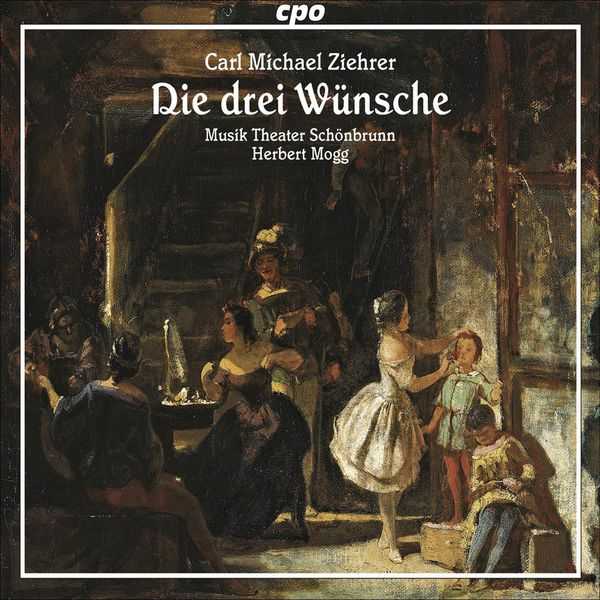
Composer: Carl Michael Ziehrer
Performer: Volker Vogel, Donna Ellen, Valeriy Serkin, Lorena Espina, Klemens Slowioczek, Anna Siminska, Michael Heim, Alfred Berger, Cornelia Zink, Schonbrunn Music Theater Chorus
Orchestra: Orchester des Musik Theater Schoenbronn
Conductor: Herbert Mogg
Format: FLAC (tracks)
Label: CPO
Catalogue: 7774042
Release: 2009
Size: 138 MB
Recovery: +3%
Scan: cover
Die 3 Wunsche
CD 01
Prologue
01. Overture
02. Scene and Chorus (Littke, Schuster-Bellheim, Sternthal) [In a village on the Rhine the theater troupe headed by Director Hummel presents a chivalric drama]
03. Dialogue (Lotti, the niece of the innkeeper Wegerer, Is enthusiastic about the presentation) [Sternthal, Lotti, Wegener, Chorus]
04. Ensemble and Lied (for her part, Lotti has very difficult ideas about the ideal man) [Wegener, Lotti, Chorus]
05. Ensemble and Couplet (Theater Director Hummel reveals major news to his troupe) [Chorus, Hummel]
06. Dialogue (Hummel and Wegerer agree That Lotti can go with the theater troupe to the town) [Laura, Hummel, Littke, Dawison, Wegerer, Chorus]
07. Lied (Schon Gretelein) [Lotti]
08. Dialogue (Hummel promises Lotti That he will make her a star) [Hummel, Lotti, Zingara]
09. Melodrama and Finale (Zingara, Lotti, Hummel, Chorus) [That her three wishes will be granted If she confides them to a star falling from the sky. The theater company sets out with Lotti …]
Act I
10. Chorus and Entrance (Chorus, Fogosch, Kathe) [the servants at Fogosch’s house have prepared everything for a big party]
11. Dialogue (Fogosch, Kathe, Jean) [Fogosch would like to marry his daughter Kathe to Fedor]
12. Duet (Baronin, Fedor) [from the entrance duet of Baroness Besebeck and Fedor one learns That he has lost his heart to an artist …]
13. Dialogue (Fogosch must admit to himself That there Are no guests in his house for the party) [Baronin, Fedor, Fogosch]
14. Choir of Cadets – Lied (Chorus, Kathe, Fritz) [Lieutenant Fritz, summoned by Kathe, comes to the castle with his cadets and sings praise to the irresistability of soldiers]
15. Dialogue (Kathe reveals her father’s plans to Fritz and again wants to win him for herself) [Kathe, Fritz, Fogosch, Jean]
16. Entrance of the Actors (the theater company comes to the castle and underscores the versatility of its representational artistry) [Hummel, Chorus, Lotti]
17. Dialogue (Hummel offers his actors to the desperate Fogosch as replacements for the guests) [Hummel, Fogosch, Lotti, Kathe]
18. Dance song with Chorus (Lotti, Chorus) [Lotti underscores her multifacetedness in a multilingual dance song]
CD 02
01. Dialogue (Fogosch, Baronin, Kathe, Fedor) [Fogosch and the Baroness leave Kathe and Fedor alone]
02. Duet (Kathe, Fedor) [Kathe and Fedor imagine how horrible their life together would have been]
03. Dialogue (Fogosch presents one of the guests, Count Senders in the person of Theater Director Hummel, to the Baroness) [Fritz, Jean, Baronin, Fogosch, Hummel, Lotti, Fedor]
04. Lied (Lotti) [Lotti reads the last love letter That she received from Fedor and sums up]
05. Finale (the party at Fogosch’s house reaches its high point) [Baronin, Fogosch, Fritz, Hummel, Kathe, Fedor, Lotti, Chorus]
Act II
06. Chorus of Cadets (the soldiers prepare for their departure) [Chorus]
07. Couplet (Hummel praises his wife in the famous couplet) [Hummel, Chorus]
08. Dialogue (Fritz raves about the night he has spent with Kathe) [Fritz, Adjutant, Kathe, Fogosch, Hummel, Lotti, Fedor]
09. Duet and Quartet (the four lovers once and for all Are reunited) [Fedor, Lotti, Fritz, Kathe]
10. Dialogue (Hummel, Baronin, Kathe, Fogosch, Fritz, Fedor, Lotti) [Now all That has to be done Is to get the Baroness to agree to the wedding between Lotti and Fedor]
11. Finale (Everybody Is happy and content; the cadets and the comic players go on their way and for the latter) [Lotti, Chorus]
Carl Michael Ziehrer’s career shared many similarities to that of Johann Strauss II. His waltzes, marches and polkas were extremely popular in Vienna and he was one of Strauss’s biggest rivals. His legacy includes nearly 600 dance pieces and marches as well as twenty two operettas.
This new release dedicated to the Austrian master features one of his most enchanting operettas; Die drei Wuensche. Catchy melodies made his music popular but he preferred to assign the instrumentation and arrangement of his operettas to others. It is suggested this operetta was arranged by Alexander Zemlinsky. Die drei Wuensche is a pleasing discovery for CPO and restores a composer whose talent has been overlooked for too long.